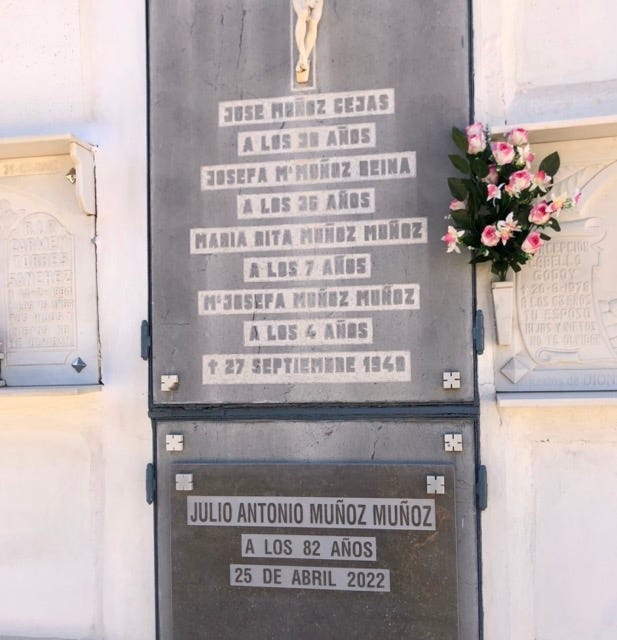In Spain, November 1 is a national holiday: El Día de Todos los Santos, or All Saints Day. Concha and I don’t usually make a holy day out of the holiday, but her father passed away last spring, so this year we took the two-hour trip to the cemetery in Puente Genil, where he is interred, to pay our respects.
Taken with the one above it, Don Julio’s tombstone tells a compelling story, at once horrific and instructive. On the first stone, we find the names of his father, mother, and two sisters, deceased at the ages of 38, 36, 7, and 4. All of them, the stone reports, died on the same day: September 27, 1949. The stone does not mention how they died—by drowning, in a flash flood that ravaged their inaptly named hometown of Aguadulce (“sweet water”). It does not tell us that, had the family stayed put in their house that day, they might have all gone on to live long and fruitful lives: José Muñoz worked for the railroad, and was trying to move his family up to the rail yard, on higher ground, when the flood caught them. Trying to save his family, he doomed them. When all was said and done, these were the only casualties of the Aguadulce flood.
But for a spectacular twist of fate, there might have been one more. That’s the story of the second stone. The second stone is dedicated to the memory of Concha’s father, Julio Muñoz, deceased on April 25 of this year, at the age of 82. This stone does not tell us that Julio Muñoz was the firstborn son of José Muñoz. It does not tell us that Julio Muñoz is not listed on the first stone, with his parents and sisters, because he happened to be visiting cousins in a neighboring town the day the flood swept them away.
How does a nine-year-old deal with something like this? When I was nine, I couldn’t deal with losing a game of Pac-Man. (The Atari cheated, I insisted.) I simply cannot imagine the psychological fallout. It’s like some sick grab bag of trauma. Abandonment, loss, survivor’s guilt. The crushing "What if?"s playing on an endless loop. I do not know how Concha’s father managed. I only know that, somehow, he did. Somehow he went on to have six children of his own, and build a successful business to provide for them. The business was irrigation, which is to say he looked for, and found, water in Andalusia.
I never talked to Don Julio about the flood. As a rule, he didn’t talk about it. But what I’ve often reflected upon, ever since Concha first told me the story, is just how extraordinary it is that any of us are here, alive on earth, at all. How many trillions of accidents and coincidences, over how many billions of years, did it take to land you right here, right now? How many near misses and close shaves did you survive before you were even born?
The first stone testifies to the incomprehensible brutality of the universe; the second, to its equally incomprehensible mercy. Taken together, the two serve as a reminder of just how precious life on earth is. At any moment, this ineffable gift we have all been given can be taken away. At some point, it will be. Until that time, memento vivere. Remember to live.

